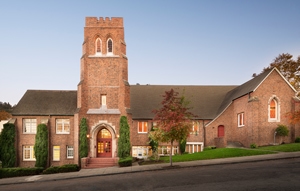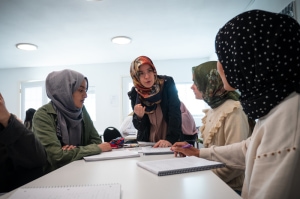Abraham: Leader for the Nations
The month of Dhu’l Hijjah tends to make us reflect upon the life and legacy of the great patriarch and father of the prophets, Abraham, upon him be peace.
During the Hajj, pilgrims follow the example of his family, and the qurbani sacrifice of Eid al-Adha commemorates
one of the most striking moments of this great prophet’s life. But the life of Abraham is replete with examples, going back to his earliest days.
In his childhood, Abraham found himself at odds with his family, pagans who built idols. With clear reasoning, he could tell that these were nothing more than
objects, despite the fervent worship shown to them by his community. He fled, retreating into the wilds and reflecting on the signs written into creation itself. He found a group of
worshippers of celestial bodies, demonstrating to them that for all their grandeur, neither the sun, moon, nor stars behold any intrinsic power. They too depend on an all-powerful Creator
that rules the Heavens and the Earth.
God tells us in the Qur’an (Al-An’am:75-80):
“So We were showing Abraham the kingdom of the heavens and earth, that he might be of those having sure faith.
When night outspread over him he saw a star and said, ‘This is my Lord.’ But when it set he said, ‘I love not the setters.’
When he saw the moon rising, he said, ‘This is my Lord.’ But when it set he said, ‘If my Lord does not guide me I shall surely be of the people
gone astray.’
When he saw the sun rising, he said, ‘This is my Lord; this is greater!’ But when it set he said, ‘O my people, surely I am quit of that you
associate.
I have turned my face to Him who originated the heavens and the earth, a man of pure faith; I am not of the idolaters.’
His people disputed with him. He said, ‘Do you dispute with me concerning God, and He has guided me? I fear not what you associate with Him, except my Lord
will aught. My Lord embraces all things in His knowledge; will you not remember?’”
This moment illustrates the intelligence of the Prophet Abraham, and his desire to teach people to differentiate right from wrong. He did not make these
observations for himself, but to demonstrate their truth to the people around him.
Abraham returned to his family, bringing the truth to them, only to be turned away and face death. Cast out from his family, Abraham had no one to depend on but
God.
And God made this man, who found himself without family, a father of many nations. God says in the Qur’an (Maryam: 49-54):
“So, when he went apart from them and that they were serving, apart from God, We gave him Isaac and Jacob, and each We made a
Prophet;
and We gave them of Our mercy, and We appointed unto them a tongue of truthfulness, sublime.
And mention in the Book Moses; he was devoted, and he was a Messenger, a Prophet.
We called to him from the right side Of the Mount, and We brought him near in communion.
And We gave him his brother Aaron, of Our mercy, a Prophet.
And mention in the Book Ishmael; he was true to his promise, and he was a Messenger, a Prophet.”
The trials of Abraham, upon him be peace, were countless, but his trust in God was absolute. With this reliance, he knew that no earthly challenge could overwhelm,
and he was taken safely through what seemed certain death.
We see this trait in Hagar, in Sarah, in the Prophets Ishmael and Isaac, upon them all be peace. Each confronted calamity with trust in the power of God over all,
and from these people came innumerable prophets, including Jacob, Joseph, Moses, Aaron, Jesus, upon them all be peace, and the Seal of the Prophets ﷺ.
In the Qur’an, God tells Abraham that he will make him an imam for the people. In
this classical meaning of the word, it means an example to follow. So, we must strive to do so.
We pray that God makes us among those who trust wholly in Him as did His Prophet Abraham, peace and blessings be upon him.
Jibran Khan is the editor of Read & Rise.



